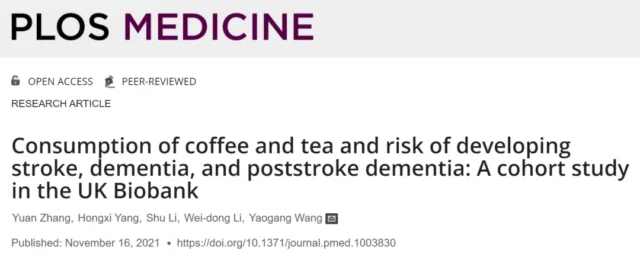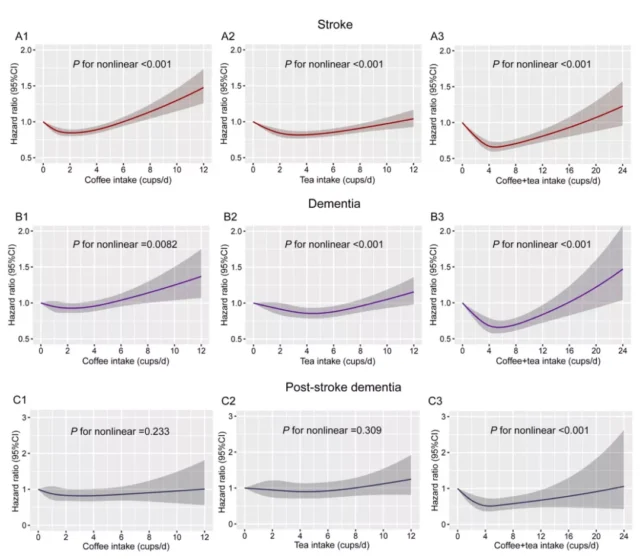Coffee or Tea: Which can reduce the risk of stroke and dementia?
- Well-Known Japanese Medicine Exposed for 30 Years of Data Falsification
- Oregon Reverses Course: From Decriminalization to Recriminalization of Drug Possession
- Why Lecanemab’s Adoption Faces an Uphill Battle in US?
- Yogurt and High LDL Cholesterol: Can You Still Enjoy It?
- WHO Releases Global Influenza Vaccine Market Study in 2024
- HIV Infections Linked to Unlicensed Spa’s Vampire Facial Treatments
Coffee or Tea: Which can reduce the risk of stroke and dementia?
- Was COVID virus leaked from the Chinese WIV lab?
- HIV Cure Research: New Study Links Viral DNA Levels to Spontaneous Control
- FDA has mandated a top-level black box warning for all marketed CAR-T therapies
- Can people with high blood pressure eat peanuts?
- What is the difference between dopamine and dobutamine?
- How long can the patient live after heart stent surgery?
Coffee or Tea: Which can reduce the risk of stroke and dementia?
According to data released by the National Center for Cardiovascular Diseases last year, there are 270 million people with hypertension in some countries, and the prevalence rate of hypertension for residents aged 18 and above is 25.2%, and it is still on the rise. This means that one in four people has high blood pressure.
As we all know, hypertension is an important risk factor for cardiovascular and cerebrovascular diseases, and it will significantly increase the incidence of complications such as stroke (stroke) . Therefore, hypertension is the most important risk factor for stroke. Stroke is a life-threatening event, causing 10% of the deaths of patients worldwide. Compared with Europeans and Americans, Chinese people with high blood pressure are more likely to have a stroke.
Statistics show that the incidence of stroke in some countries is 246.8 per 100,000, which is higher in men than in women, and significantly higher in rural areas than in urban areas. Moreover, post-stroke dementia is a major public health problem. Because there is no effective treatment for dementia.
Previous epidemiological studies have found that drinking coffee or tea is associated with a lower risk of stroke and dementia. However, the relationship between coffee and tea intake and post-stroke dementia events is still poorly understood.
On November 16, 2021, Wang Yaogang’s team from Tianjin Medical University published a research paper titled: Consumption of coffee and tea and risk of developing stroke, dementia, and poststroke dementia: A cohort study in the UK Biobank in the journal PLOS Medicine .
This large cohort study found that drinking coffee or tea, or a combination of both may be related to reducing the risk of stroke, dementia, and post-stroke dementia.

Coffee and tea are the most widely consumed beverages (one of) in the world, and the health benefits of both have been widely reported.
In this new study, the researchers surveyed 365,682 participants between the ages of 50 and 74 from the UK Biobank , 45.7% of whom were men. These participants joined the study between 2006 and 2010 and were followed up until 2020. Since most dementias occur over the age of 50, the researchers selected individuals who were at least 50 years old at baseline.
Participants provided extensive information through questionnaires, interviews, health records, physical measurements, and blood samples. Coffee and tea intake at baseline were obtained through questionnaire assessment. In total, 75986 (20.8%) participants did not drink coffee and 50009 (13.7%) participants did not drink tea.
During the follow-up period, 5079 participants developed dementia and 10053 experienced at least one stroke.
Researchers found that people who drink 2-3 cups of coffee or 3-5 cups of tea a day, or 4-6 cups of coffee and tea in combination have the lowest risk of stroke or dementia.
Compared with those who drink neither coffee nor tea: People who drink 2-3 cups of coffee and 2-3 cups of tea a day have a 32% lower risk of stroke and a 28% lower risk of dementia ; coffee and tea intake The amount is related to the reduced risk of ischemic stroke and vascular dementia .
In addition, the combination of tea and coffee is associated with a lower risk of post-stroke dementia; drinking 3-6 cups of coffee and tea a day has the lowest risk of post-stroke dementia .

Researchers believe that there are interactions between coffee and tea related to stroke and dementia. There are several mechanisms that suggest that the combination of the two may be related to stroke and dementia. First of all, coffee is the main source of caffeine, and contains polyphenols and other biologically active compounds with potentially beneficial health effects. Similarly, tea is also rich in caffeine, catechin polyphenols and flavonoids. These substances are believed to have neuroprotective effects, such as anti-oxidative stress, anti-inflammatory, inhibition of β-amyloid accumulation and anti-apoptosis.
Although coffee and tea are different beverages, they have overlapping and different ingredients. A potential mechanism may be related to the different antioxidants and other protective biologically active substances in the two beverages .
Second, both coffee and tea contain specific polyphenols . The former is characterized by hydroxycinnamic acid and the latter is characterized by catechins. They show potential benefits in improving endothelial function, insulin resistance and anti-inflammatory, and they have different characteristics. Target molecule. Therefore, the specific polyphenol content of the two may play a combined protective role in the pathogenesis of stroke and dementia.
Third, both coffee and tea are associated with lower cardiometabolic risks, including type 2 diabetes, high blood pressure and cardiovascular disease. Therefore, drinking these two beverages may have common health benefits in preventing the risk of stroke and dementia.
Fourth, this interaction may also occur accidentally.
About drinking coffee and tea may jointly regulate the activation of certain cytokines, but it needs further verification in animal experiments.
The researchers said that the UK Biobank reflects a sample of relatively healthy people, which may limit the ability to generalize these associations. In addition, there are relatively few people suffering from dementia or stroke, so it is difficult to accurately infer the incidence in a larger population. Therefore, although drinking coffee and tea may help prevent stroke, dementia, and post-stroke dementia, causality cannot be inferred from these associations.
In summary, the results of this study show that moderate consumption of coffee and tea, whether taken alone or in combination, is associated with a lower risk of stroke and dementia.
Paper link:
https://doi.org/10.1371/journal.pmed.1003830
Coffee or Tea: Which can reduce the risk of stroke and dementia?
(source:internet, reference only)
Disclaimer of medicaltrend.org
Important Note: The information provided is for informational purposes only and should not be considered as medical advice.



